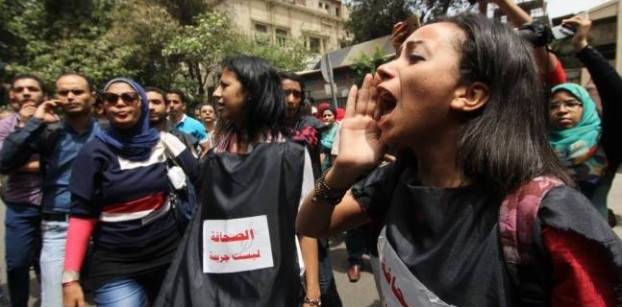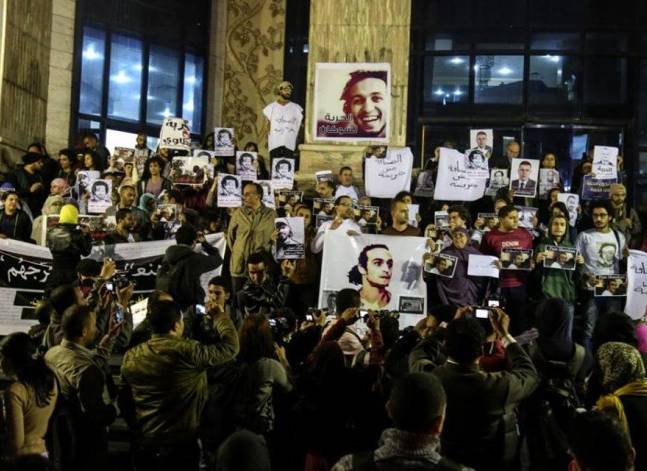Latest NEWS
- Aswat Masriya, the last word
- Roundup of Egypt's press headlines on March 15, 2017
- Roundup of Egypt's press headlines on March 14, 2017
- Former Egyptian President Hosni Mubarak to be released: lawyer
- Roundup of Egypt's press headlines on March 13, 2017
- Egypt's capital set to grow by half a million in 2017
- Egypt's wheat reserves to double with start of harvest -supply min
- Roundup of Egypt's press headlines on March 12, 2017
Self-exiled Egyptians cite fear of legal prosecution - report
Journalists gather outside the Press Syndicate in downtown Cairo ahead of an emergency general assembly meeting on May 4, 2016, in protest to a police raid on the syndicate and the arrest of two journalists. ASWAT MASRIYA
CAIRO, Nov 15 (Aswat Masriya) - Egypt's mounting political, economic and social challenges in recent years have taken a toll on its citizens, forcing some into self-exile as they attempt to avoid the imminent pressures bound to arise amid a general decline in living standards, freedoms and political engagement.
The Arabic Network for Human Rights Information (ANHRI) published on Tuesday a report titled "The Third Wave of Expatriation..On the Compulsory Migration of Egyptians," tackling the recent phenomenon of people being forced to leave the country.
The third expatriation, as described by the report, began under the rule of the Supreme Council of the Armed Forces (SCAF), and escalated in the wake of the June 30 mass protests and the subsequent ouster of former president Mohamed Mursi.
The first and second expatriations took place at different points in time following July 1952. The first one involved Muslim Brotherhood members and supporters fleeing under the rule of President Gamal Abdel Nasser, while the second was taken up by "leftists and nationalists" in the mid-1970s during Sadat's reign, according to the report.
In the report's introduction, History Professor Khaled Fahmy describes the latest wave of departures as "a kind of departure or immigration in search for a more-welcomed political horizon that is not subjected to fear, inquisition, repression, treason charges, prosecution or defamation."
The Egyptian government has led a heavy crackdown against Muslim Brotherhood members and supporters along with journalists, students, activists and academics since Mursi's ouster.
According to the Egyptian Initiative for Personal Rights (EIPR), at least 1,464 people are held in Egyptian prisons pending trial for periods that have exceeded the legal limit.
The report cites the "legal framework" as one of the reasons behind the growing number of Egyptians going into exile. Defects with regards to respecting the constitution and international human rights covenants, lack of respect for freedom of expression and deficiencies in the justice system were all cited as reasons that fostered the climate of fear.
Fear of retaliation by the regime in the form of fabricated charges, politicised trials, prolonged detentions and travel bans were expressed by those surveyed in the report as factors that contributed to their decision to leave the country.
“I immigrated because I was brought to trial in a well-known opinion case. I wasn’t banned from travelling. However, upon my repeated return to Egypt to attend my trial in mid 2012, I was subjected to threats and pressure from the regime. The court sentenced me to two years of imprisonment," a testimony by Y.L read.
He added that he decided to settle abroad given his work and stance towards the ruling regime.
A journalist interviewed in the report emphasised the restrictions placed on press freedom, saying, "sometimes my articles were banned and I was prevented from hosting guests." He clarified that he was not subjected to harm or abuse but that there was constant intimidation practiced by those around him, causing him to leave Egypt.
The report indicated that only four out of 31 respondents said they were unwilling to voluntarily return to Egypt, while the rest expressed their desire to return on condition "that a major breakthrough in the public space would be achieved and that they wouldn’t be subjected to prosecution."
The expatriates' stay could be prolonged due to a number of reasons attributed to their career, family life, and the quality of life in general in a given country, according to the report.
"Such a matter causes their homeland to be deprived from benefiting from their experience and qualifications," the report states, as it described how this wave of expatriation involved a broader section of society, including "academics and professionals who left Egypt because they were committed to the values of their professions."
The report is based on a sample of 31 testimonies and surveys conducted by the network's researchers, with the identity of the respondents kept anonymous. The sample excludes suspects into violence or terrorism cases.
















